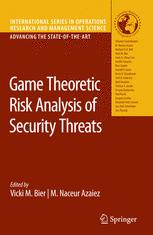

Most ebook files are in PDF format, so you can easily read them using various software such as Foxit Reader or directly on the Google Chrome browser.
Some ebook files are released by publishers in other formats such as .awz, .mobi, .epub, .fb2, etc. You may need to install specific software to read these formats on mobile/PC, such as Calibre.
Please read the tutorial at this link: https://ebookbell.com/faq
We offer FREE conversion to the popular formats you request; however, this may take some time. Therefore, right after payment, please email us, and we will try to provide the service as quickly as possible.
For some exceptional file formats or broken links (if any), please refrain from opening any disputes. Instead, email us first, and we will try to assist within a maximum of 6 hours.
EbookBell Team

5.0
60 reviewsGame Theoretic Risk Analysis of Security Threats introduces reliability and risk analysis in the face of threats by intelligent agents. More specifically, game-theoretic models will be developed for identifying optimal and/or equilibrium defense and attack strategies in systems of varying degrees of complexity. The book covers applications to networks, including problems in both telecommunications and transportation. However, the book’s primary focus is to integrate game theory and reliability methodologies into unified techniques to predict, detect, diminish, and stop intentional attacks at targets that vary in complexity.
In this book, leading researchers combine reliability and risk analysis with game theory methods to create a set of functional tools that can be used by security personnel to offset intentional, intelligent threats (including the threats of terrorism and war). This means a comprehensive treatment of such problems must consider two aspects: (1) the structure of the system to be protected and (2) the adaptive nature of the threat (that is, beyond the static nature of the threat). The book provides a set of scientific tools for analyzing and applying game-theoretic reliability problems in the presence of intentional, intelligent threats. These scientific tools address problems of global safety and create more cost-effective defensive investments.